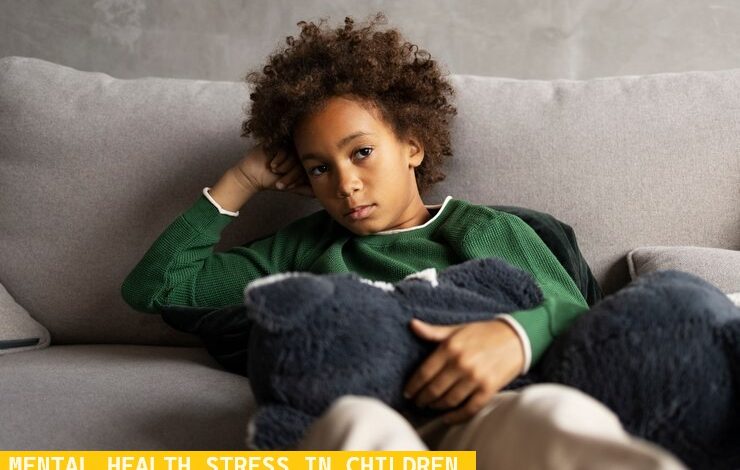9 Amazing Signs: Understanding the Symptoms of Mental Health Stress in Children

9 Amazing Symptoms of Mental Health Stress in Children You Should Know
Introduction
In today’s fast-paced world, children are increasingly vulnerable to mental health stressors that can impact their overall well-being. As caregivers and educators, it is crucial to recognise the signs and symptoms of mental health stress in children to provide timely support and intervention. This article aims to explore these signs in detail, drawing on thorough research and expert insights to help identify when a child may be struggling with mental health stress.
1. Physical Signs
Changes in appetite or weight: Significant fluctuations in a child’s appetite or weight, whether it is a sudden increase or decrease, can be indicative of underlying mental health stress. Research has shown that stress hormones can affect appetite regulation, leading to changes in eating habits thereby bringing about weight gain or loss.
Frequent complaints of headaches or stomachaches that persist despite medical evaluation may signal emotional distress in children. These somatic symptoms are often linked to stress and anxiety.
Disruptions in sleep, including difficulty falling asleep, frequent waking during the night, or excessive sleepiness during the day, can be manifestations of mental health stress in children. Sleep disturbances are closely linked to anxiety and mood disorders (swings) in this population.
2. Emotional Signs

A prolonged period of sadness or moodiness that interferes with a child’s daily functioning may indicate underlying mental health stress. It is essential to differentiate between typical mood fluctuations (mood swings) and persistent negative emotions that warrant further attention.
Children experiencing mental health stress may exhibit irritability or frequent outbursts of anger disproportionate to the situation. These emotional responses can be a coping mechanism for underlying feelings of anxiety or distress.
Also, excessive worrying or anxiety about everyday events or future uncertainties can be a sign of mental health stress in children. Anxiety disorders are among the most common mental health conditions affecting children and adolescents.
3. Behavioral Signs
Withdrawal from social activities or friends: A sudden withdrawal from social interactions or activities once enjoyed with peers may signal emotional distress in children. They may isolate themselves as a way to cope with overwhelming feelings or avoid stressful situations.
Decreased interest in activities once enjoyed: Loss of interest in hobbies, sports, or other activities that previously brought joy can be indicative of mental health stress. Children may lose motivation or pleasure in activities due to underlying emotional struggles.
Difficulty concentrating or focusing: Mental health stress can impair a child’s ability to concentrate or pay sufficient attention, leading to difficulties in school or other tasks requiring sustained attention. Persistent distractibility and poor focus may be early indicators of underlying mental health concerns.
4. Cognitive Signs
Poor academic performance despite effort: A decline in academic performance, despite attempt to motivate the child to put-in best efforts, may be a red flag for mental health stress. Stress and anxiety can interfere with cognitive functioning, affecting memory, attention, and problem-solving abilities.
Negative self-talk or low self-esteem: Children experiencing mental health stress may engage in negative self-talk or exhibit low self-esteem and this may stick with them as they grow older. They may be overly critical of themselves, doubt their abilities, or have a distorted perception of their worth.
Difficulty making decisions or problem-solving abilities: Mental health stress can impair a child’s ability to make decisions or solve problems effectively. They may feel overwhelmed by choices or struggle to generate solutions to everyday challenges.
5. Social Signs
Trouble interacting with peers or forming friendships: Difficulties in social interactions or forming meaningful friendships may indicate underlying mental health stress in children. They may struggle with social skills, have trouble initiating or maintaining conversations, or experience social anxiety.
Avoidance of social situations or events: Children experiencing mental health stress may avoid social situations or events that trigger feelings of anxiety or discomfort (in this case, it does not matter entertaining an event may seem). They may prefer to be alone rather than risk facing social scrutiny or rejection.
Increased conflict with family members or authority figures: Heightened conflict with family members, teachers, or other authority figures can be a sign of underlying emotional turmoil in children. They may lash out or become defiant as a way to express their distress or assert independence.
6. Environmental Triggers of Mental Health Stress in Children

Significant life changes or traumatic events, such as divorce, relocation, or the loss of a loved one, can trigger mental health stress in children. These experiences disrupt their sense of stability and security, leading to emotional upheaval.
Pressure or performance expectations: High academic expectations, pressure to excel, or fear of failure can contribute to mental health stress in children (sometimes this form of stress comes from parents who tend to compare their children with others who are probably doing way better). The competitive nature of school environments and the emphasis on academic achievement can take a toll on their emotional well-being.
Children exposed to violence, trauma, or abuse are at a higher risk of experiencing mental health stress. These adverse experiences can have profound and long-lasting effects on their psychological and emotional development.
7. Developmental Considerations
The presentation of mental health stress may vary depending on a child’s developmental stage. For example, younger children may express distress through behavioral changes, while adolescents may exhibit more internalised symptoms such as mood swings.
Developmental milestones, such as starting school or puberty, can as well influence the manifestation of mental health stress in children. It is of great importance to consider age-appropriate expectations and recognise when developmental challenges may contribute to emotional difficulties.
8. Cultural and Gender Differences
Cultural factors play a significant role in how children express and perceive mental health stress. Cultural norms, beliefs, and attitudes towards emotions and mental health can shape the way symptoms are recognised and addressed within families and communities.

Boy and girls may exhibit different patterns of symptoms related to mental health stress, influenced by societal expectations and gender roles. Boys, for example, may be more likely to externalise their distress through disruptive behavior, while girls may internalise their struggles and experience symptoms such as anxiety or depression.
9. When to Seek Help
Certain signs and symptoms, such as thoughts of self-harm, extreme withdrawal, or significant changes in behavior, may warrant for immediate professional help. It is essential to take any concerns about a child’s mental health seriously and seek help from a qualified mental health professional within or outside one’s immediate environment.
Early recognition and intervention are critical for addressing mental health stress in children and preventing long-term consequences. The sooner children receive support and treatment, the better their chances of recovery and resilience.
There are numerous resources available for parents, caregivers, and educators to access support and guidance when concerned about a child’s mental health. Mental health professionals, school counselors, and community organisations can provide assessment, therapy, and other interventions to help children cope with mental health stress.
In Conclusion
Recognising the signs and symptoms of mental health stress in children is important for promoting their well-being and ensuring they receive the support they need. By understanding the various indicators of mental distress, caregivers and educators can intervene early and effectively to address underlying issues and prevent long-term consequences. Through awareness, empathy, and proactive intervention, we can create a supportive environment where children feel safe, valued, and empowered to succeed.
Reference Links you may find useful.
- American Academy of Child & Adolescent Psychiatry (AACAP)
- Centers for Disease Control and Prevention (CDC) – Children’s Mental Health
- National Institute of Mental Health (NIMH) – Child and Adolescent Mental Health
- Child Mind Institute – Understanding Child Mental Health
- Mayo Clinic – Children’s Mental Health




